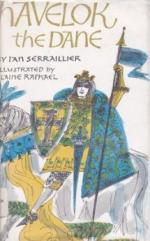“I cannot tell,” answered my brother. “It seems to be there when needed.”
“Well, it is not that used here. Get the housecarls to teach you better manners.”
Then Havelok bowed a little, in token that he would do so; and when Alsi spoke to him next it was in Welsh.
“You are a marshman, as I hear?”
Now Havelok had learned fairly well from the poor folk who loved him, but carelessly, so that when he answered Alsi frowned at his way of speaking.
“I am from the marsh,” he said simply.
“We had better get back to English!” the king said; “you people forget your own tongue. Now, are you married?”
Thereat Havelok laughed lightly.
“That I am not,” he answered.
“Well, then, if I find you a fair wife, you would be willing, doubtless?”
“That I should not,” answered Havelok bluntly, and wondering what this crafty-looking king was driving at. “What could I do with a wife? For I have neither house nor goods, nor where to take her, nor withal to keep her; else had I not been the cook’s knave.”
“It would seem that you carry all your fortune on your back, therefore,” said Alsi, looking at Havelok’s gay attire with somewhat of a sneer.
“That may well be, King Alsi, for even these clothes are not my own. Berthun gave them me, and I think that they come from yourself.”
Alsi grinned, for Eglaf’s saying of him was not so far wrong; but he had more serious business on hand than to talk of these things with a churl.
“Now, if I bid you, it is your part to obey. I have a wife for you, and her you shall wed.”
“There are two words to that, King Alsi. Neither will I wed against my will, nor will I wed one who is unwilling.”
“As to that first,” said the king, for he began to be angered with Havelok’s boldness, “if a man will not do my bidding, I have dungeons where he can have time to think things over, and men who can keep him there, be he never so mighty; and if a man will not see with my eyes when I bid him, blinded shall he be.”
This he said somewhat hurriedly, for a dark flush came on the face of the man before him, and he thought that he must try some other plan than force with him.
“And as for that other point, I did not so much as hint that the bride was likely to be unwilling. I will say that she is willing, rather.”
Now that troubled Havelok, for it seemed that all was arranged already, and the thought of the dungeon was not pleasant. There was no doubt that if the king chose he could cast him into one until he was forgotten; and the light and the breath of the wind from the sea were very dear to Havelok. So he thought that he would at least gain time by seeming to listen to the proposal; for, after all, it might come to nothing, and maybe it was but a jest, though a strange one.
“Well, lord king,” he said, “if the bride knows enough of me to be willing, it is but fair that I should have the like chance of choice.”




